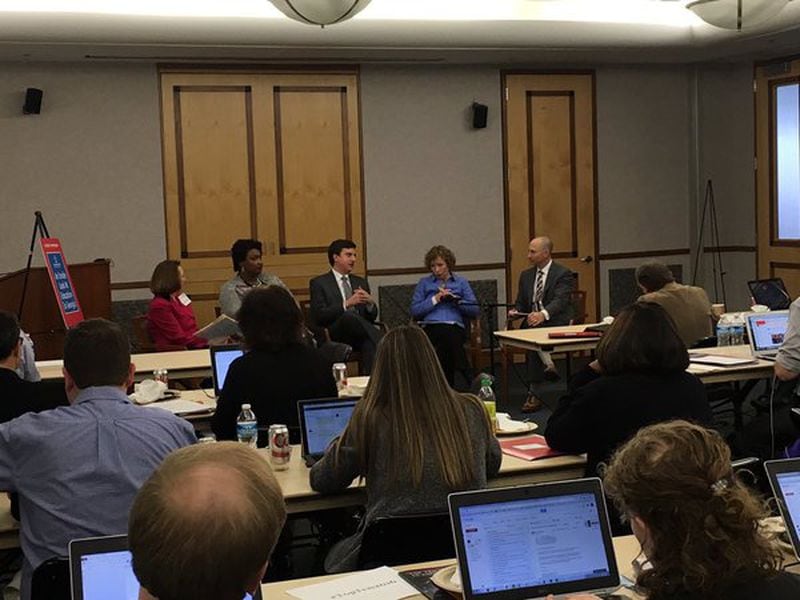Of the many speakers at Friday's media forum sponsored by the Georgia Partnership for Excellence in Education, Michael Petrilli, president of the Thomas B. Fordham Institute , was the most provocative, probably because he was the least beholden. The institute is a Washington-based education-policy think tank.
Credit: Maureen Downey
Credit: Maureen Downey
Most speakers at the all-day forum for education reporters worked for the state of Georgia or deal with the state so their comments tended to be more circumspect.
A self-described conservative and a noted education reform voice, Petrilli applauded Gov. Nathan Deal's efforts to create a state school district that will take over failing schools from districts. Georgia voters will decide in November whether to grant the governor the ability to wrest control of schools from districts and place them in an Opportunity School District where they could be remade as charter schools. Deal modeled his proposal after takeover districts in New Orleans and Tennessee.
Petrilli made an interesting point about why yanking a school out of a local district could spur improvement. "My experience has been that the problem isn’t schools are dysfunctional; the system is dysfunctional. If you try to fix the school and the system doesn't change, the school will go right back to failing," he said.
By freeing a struggling school from system with a poorly functioning human resources system or inert central office leadership, you could be giving it a "new lease on life so it can turn around and succeed," he said.
While the governor would have appreciated Petrilli's support of his state takeover plan, Nathan Deal probably would not have liked his comments about merit pay. Petrilli said Georgia may be the only state using students' academic performance --- how they perform on standardized tests --- for half of a teacher's evaluation. Other states rely less on test scores to gauge teacher effectiveness, he said.
Basing 50 percent of a teacher's evaluation on a student performance on a single test is bound to upset teachers, said Petrilli, especially if the test is questionable.
Petrilli remains disappointed Georgia pulled out of the Partnership for Assessment of Readiness for College and Careers, a collection of state education officials designing a new Common Core test. Georgia decided the cost of the PARCC tests was too high so it opted to create its own cheaper version, the Milestones.
When Georgia announced in 2013 it was leaving PARCC and going it alone, Petrilli tweeted, “Shame on Georgia. You really can’t afford to spend 1/3 of 1% of your per pupil funding on tests?”
Petrilli says Georgia ended up with a "$12 fill-in-the blank test." The test that came out of PARCC -- which Petrilli called "dramatically better" -- costs about $29.50 per student.
Among other notable comments at the media forum:
State School Superintendent Richard Woods spoke about his first year in office, a year in which he stayed well out of political frays, avoiding stands on Deal's Opportunity School District or merit pay.
That did not change at Friday's forum.
After giving us a summary of DOE's r ecent teacher survey , which revealed widespread discontent with performance pay, I asked Woods why he wasn't speaking out against Deal's merit pay plan. It was clear the dispiriting survey results pained Woods, who appeared to tear up as he explained how unhappy teachers were and how most did not want their children to follow in their footsteps.
Given Woods' obvious angst over teacher dissatisfaction, why not discourage the governor from pressing for merit pay? ( A new AJC poll found only 39 percent of Georgia voters support "merit pay" for teachers.)
Woods responded he was not aware yet of the form Deal's merit plan would take, telling me, “With respect to the governor, I’ve not seen the final project or what it looks like. I don’t want to overstep my bounds."
Asked the same question in a slightly different way by another reporter a few minutes later, Woods repeated, "I have not seen what the governor's full proposal will be... I don't wish to impose on him in that."
During a break, my AJC colleague Kyle Wingfield and I agreed Woods' responses show the estrangement between the governor's office and the DOE, a chasm that grew to a canyon under former state school chief John Barge.
You would assume a Republican governor would be discussing his plans for merit pay and the Opportunity School District with the Republican state school superintendent, and that Woods would not be waiting to see the final proposal but helping to craft it. Woods made it clear you would be assuming wrong.
There is more from the forum I want to share. I will post later Monday on some other interesting stuff.







